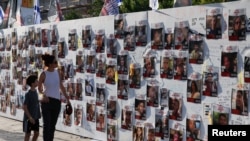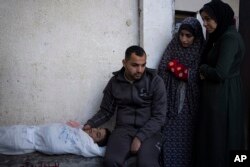A group of family members of people taken hostage by Hamas militants in the October attack on Israel is asking prosecutors at the International Criminal Court to bring charges against Hamas leaders.
The Hostages and Missing Families Forum said its visit Wednesday to the court in The Hague would advocate for charges that “encompass taking hostages, enforced disappearance, crimes of sexual violence, torture, and more severe allegations.”
Hamas militants took about 250 people hostage in the October 7 attack, during which they also killed 1,200 people according to Israeli tallies.
More than 100 of the hostages were freed during a week-long cease-fire in November, and Israel has said about 30 others are believed to have died or been killed in Gaza.
Talks aimed at brokering a new cease-fire are ongoing, including a session Tuesday in Cairo that brought together officials from the United States, Israel, Qatar and Egypt.
U.S. National Security Council spokesperson John Kirby told reporters Tuesday that the negotiations are “constructive and moving in the right direction.”
Israeli’s military reported Wednesday new airstrikes and ground operations in central and southern Gaza, including in the Khan Younis area that has been a focus in recent weeks.
International leaders have pleaded with Israel to hold off on a ground attack on the city of Rafah, nine kilometers south of Khan Younis, where many Palestinians have sought refuge from the war.
U.N. humanitarian chief Volker Turk warned that in Rafah “some 1.5 million Palestinians are packed against the Egyptian border with nowhere further to flee.”
United Nations Secretary-General Antonio Guterres told reporters Tuesday, "My sincere hope is that the negotiations for the release of the hostages and some form of cessation of hostilities to be successful, to avoid an all-out offensive over Rafah, where the core of the humanitarian system is located. And that would have devastating consequences."
As it is, Guterres said, "There is a breakdown in public order" limiting delivery of humanitarian aid to displaced Palestinians, and he blamed Israel.
"We have restrictions imposed by Israel that are not improved and limit humanitarian distribution," he said. "On the other hand, the deconflicting mechanisms to protect humanitarian aid deliveries in relation to military operations are not effective."
Israeli Prime Minister Benjamin Netanyahu said Palestinians sheltering in Rafah will be given "safe passage" out of the region near the Egyptian border but has offered no details on where they would be moved. The U.N. has said it will not help in any relocation of the Palestinians, and Egypt has said it will not allow an exodus over the border.
The Hamas-run health ministry in Gaza said Wednesday 103 more Palestinians had been killed in the past day, pushing the death toll to 28,576 during the war ignited by the shock October 7 Hamas attack.
Many people are believed to be buried under rubble of destroyed buildings across the densely populated enclave along the Mediterranean Sea, much of which is in ruins. Supplies of food, water and other essentials are running out, and diseases are spreading.
On Tuesday, South Africa voiced its concern to the International Court of Justice that Israel's plan to extend its offensive into Rafah would result in further large-scale killing and destruction. It asked the World Court to consider whether Israel needed to provide additional measures to safeguard Palestinians.
Last month, the ICJ ordered Israel to do all it can to prevent the deaths of Palestinian civilians, after South Africa, a longtime supporter of the Palestinian cause, accused the Israeli military of genocide in Gaza.
Israel has denied it is committing genocide.
Some information for this story came from The Associated Press, Agence France-Presse and Reuters.








